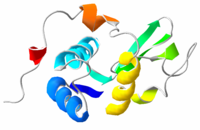Lysozyme
|
|
Lysozyme is an enzyme (EC 3.2.1.17 (http://us.expasy.org/cgi-bin/nicezyme.pl?3.2.1.17)), commonly referred to as the "body's own antibiotic" since it kills bacteria. It is abundantly present in a number of secretions, such as tears. This protein is present in cytoplasmic granules of the polymorphonuclear neutrophils (PMN) and released through the mucosal secretions (such as tears and saliva).
This enzyme functions by attacking peptidoglycan by hydrolyzing the bond that connects N-acetylmuramic acid with carbon four of N-acetylglucosamine.
Lysozyme levels in the blood are often increased in sarcoidosis.
In some forms of hereditary amyloid, the cause is a mutation in the lysozyme gene, which leads to accumulated lysozyme in several tissues (Template:OMIM).
History
Alexander Fleming (1881-1955), who discovered penicillin, described lysozyme in 1922 (Fleming A. On a remarkable bacteriolytic element found in tissues and secretions. Proc Roy Soc Ser B 1922;93:306-17).

